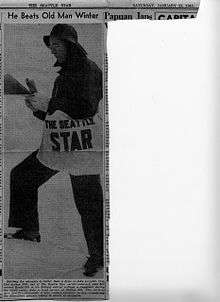The Seattle Star

The Seattle Star was a daily newspaper that ran from February 25, 1899,[1] to August 13, 1947. It was owned by E. W. Scripps and in 1920 was transferred to Scripps McRae League of Newspapers (later Scripps-Canfield League), after a falling-out within the Scripps family. The company, which eventually became Scripps League Newspapers, Inc., owned the paper until 1942, when it was sold to a group of local Seattle businessmen including Howard Parrish, its publisher. Soon after the sale, it reverted to its previous broadsheet format after having been a tabloid for a short time. Of the three Seattle general circulation dailies (Seattle Post-Intelligencer and Seattle Times being the other two), it was the smallest in circulation, although it had been the largest paper in the city around 1900.
For most of its life the paper was known as the "working man's" or "working person's" paper. It was staunchly pro-labor, reflecting the values of E.W. Scripps.[2] In 1919, it became vehemently anti-Japanese, especially toward Japanese-Americans who lived in its vicinity.[3]
After World War II, all of its assets minus the building and machinery were sold to The Seattle Times for $360,000 in 1947. Management said the sale was needed because of the rising labor costs and the newsprint shortage.
References
- ↑ Baldasty, Gerald J. (1999). E. W. Scripps and the Business of Newspapers, p. 33. Board of Trustees of the University of Illinois.
- ↑ "Ingratitude?" in I Protest: Selected Disquisitions of E. W. Scripps, edited by Oliver Knight. Madison: University of Wisconsin Press, 1966.
- ↑ Neiwert, David A. (2005). Strawberry Days: How Internment Destroyed a Japanese American Community, pp. 57–60. Palgrave Macmillan.
Sources
- The Seattle Star, 1899–1947, Seattle Public Library. As of 2014-05-09, online archive includes issues from shortly after the newspapers founding, through 1922.
- Casserly, Jack: Scripps the Divided Dynasty. Donald I. Fine, Inc. 1993.
External links
- About The Seattle star. (Seattle, Wash.) 1899-1947, Chronicling America, National Endowment for the Humanities / Library of Congress.